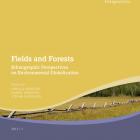This paper explores the unintended local outcomes of the centrally designed land reform in postsocialist Romania, examining two strands of this story in order to understand how land reform was thwarted at a local level. First it assesses villagers’ local ecological responses to wider neoliberal economic changes, noting how villagers have revived pre-collectivization agricultural practices, such as intercropping and crop diversification, in their attempts to survive the changes. Instead of increasing animal husbandry, the mountain villager has reacted by changing the emphasis of the local economy to rural tourism. Secondly, this paper argues that local state bureaucrats had the power and the incentive to affect the desired results of restitution of land and forest to pre-socialist owners. The bureaucrats have made use of this power to thwart the intentions of land reform. Indeed, such local power relations have shaped the postsocialist agrarian landscape.
DOI: doi.org/10.5282/rcc/6154


